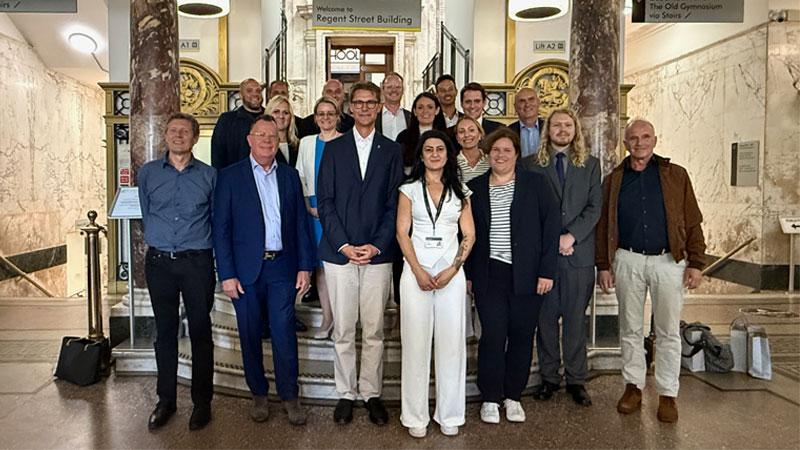Students and colleagues from the University of Westminster’s School of Social Sciences recently hosted a delegation from the Hessischer Landtag, the parliament of the German State of Hesse. Comprised of politicians, diplomats and criminal justice professionals, the group explored how Convict Criminology and Higher Education (HE) prison participatory projects can help drive improvements in criminal justice.

Convict Criminology is the study of crime and prisons by ex-convict academics and associated scholars. The academic field in the UK is led by Westminster Readers in Criminology Dr Andreas Aresti and Dr Sacha Darke, who were awarded the 2023 John Irwin Distinguished Scholar Award for their outstanding professional contributions to the study.
The visit, which took place on 20 August, opened with welcome addresses from Alan Porter, Head of the Westminster School of Social Sciences, and Professor Dibyesh Anand, Deputy Vice-Chancellor for Global Engagement and Employability. Dr Thomas Moore, Associate Head of College for Education and Students in the College of Liberal Arts and Sciences, also joined the event to welcome guests.
Dr Aresti and Dr Darke began the event with a talk on Convict Criminology at Westminster. They discussed a range of initiatives they have led at the University, including HE participatory prison projects such as Making Links with HMP Pentonville and HMP Coldingley.
This was followed by two talks on HE prisoner-university partnerships, each providing perspectives from students inside and outside prisons. The discussions showcased the lived experience of students and graduates of HE prison projects run by Westminster, including the HMP Coldingley project, and the University’s Global Criminology MA programme.
Dr Sinem Bozkurt, Lecturer in Criminology, then provided a female perspective on transition from prisoner to academic through the programme. Dr Bozkurt was awarded the 2023 Convict Criminology Early Career Award for her contributions to the Convict Criminology scholarship by someone early in their professional careers.
The event closed with a discussion session that compared issues and rehabilitation strategies across borders.
About the event Dr Aresti said: “It was an amazing experience to showcase our work to the delegation and colleagues from the German embassy. They were really impressed with the work that we are doing and were particularly inspired by the Inside and Outside student's talks on their experiences of the projects.”
Professor Anand, who attended the event and welcomed the delegates, added: “As an institution that is proud of opening doors for all, we are delighted to share our knowledge and practice with individuals and organisations from around the world. Through sharing, we learn together to make the societies better for all, including those often left out. Convict Criminology programme and its various initiatives and partnerships in different prisons is pathbreaking. We are hopeful the German delegation would have felt inspired by our colleagues and students.”
Hosting this event contributed to the United Nations Sustainable Development Goals (SDGs) 3: Quality Education, 16: Peace, Justice and Strong Institutions and 17: Partnerships for the Goals. Since 2019, the University of Westminster has used the SDGs holistically to frame strategic decisions to help students and colleagues fulfil their potential and contribute to a more sustainable, equitable and healthier society.
Find out more about studying Criminology and Sociology at the University of Westminster.


